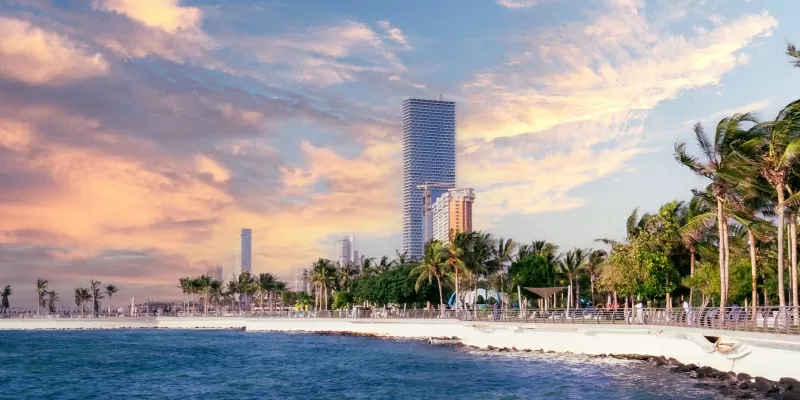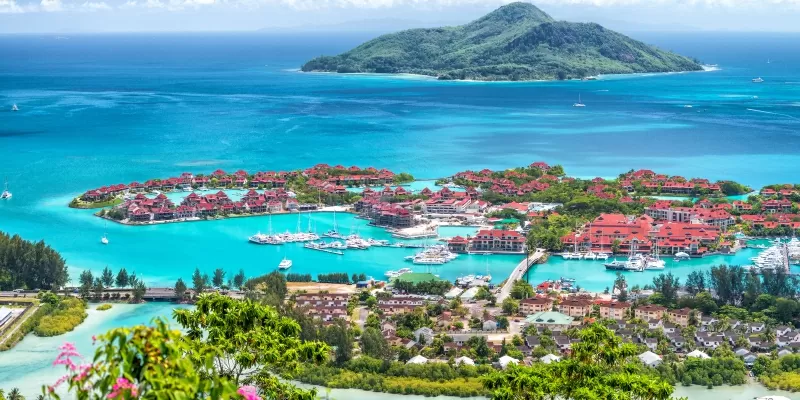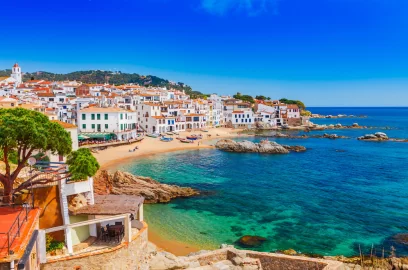15 countries without income tax: where to live and pay no tax on income

In today’s dynamic world, tax havens have become one of the few legal tax optimisation tools for both multinational companies and high-income individuals.
What is a “tax haven”?
This term is applied to small jurisdictions with a favourable tax regime for businesses, investors and wealthy foreigners. The term “tax havens” is probably also used to refer to such countries because the opportunity to save on fiscal payments is often offered by small island states, whose budget is largely formed by annual contributions from numerous international corporations.
Key attributes of a tax haven:
- The complete absence or nominality of income tax.
- Lack of an established system for exchange of tax information with other jurisdictions.
- High level of confidentiality.
- No strict requirements for offshore entrepreneurs, simplified annual reporting.
Expats appreciate such countries for the opportunity to obtain tax residency status without extended residency. Foreign investors in some “tax havens” can participate in a passport programme and obtain a second citizenship for themselves and family.
In short, countries with a favourable tax system are equally interesting for entrepreneurs who want to reduce their tax costs, investors, wealthy foreigners of the older generation, and easy-going young people.
15 countries with soft tax regimes
1. United Arab Emirates
Corporate taxation
Companies whose business activities are not related to concessionary extraction of natural resources are subject to 9% corporate tax. The income of international banks registered in the Emirates is subject to a 20% tax.
In the process of tax planning in the United Arab Emirates, you should also consider such a factor as the place of registration of your company:
- If it is one of the free economic zones, tax will only be charged on your company’s non-qualified income, i.e. such income that arises from the sale of products in the “mainland” part of the UAE, outside the FEZ.
- If the company is “mainland”, tax is assessed on the portion of profits that exceeds AED 375,000 ($102,100).
Taxation of individuals
In the Emirates, personal income is not taxable.
If a resident receives income from business activities in the Emirates that exceeds AED 1 million (> $272,270), this amount is subject to 9% tax. At the same time, income for tax purposes is not considered to be his salary and his income from investments, including real estate.
Residence permit and citizenship
Investors, entrepreneurs and expats prefer to reside in the UAE on a Golden Visa, which requires investing in a business or buying local property.
Emirati citizenship is not easy to obtain. Usually, the opportunity to naturalise comes only after 30 years of residence in the country. However, starting from 2021, wealthy foreign investors and persons with exceptional professional achievements and in-demand profession have the opportunity to obtain a UAE passport faster, within 1-1.5 years.
Advantages and disadvantages
The Emirates is a rich, dynamic jurisdiction with a high level of comfort and security. This warm country offers excellent conditions for enterprising foreigners.
There are few downsides to the UAE:
- significant difference in opportunities between residence permit holders and citizens;
- high cost of living;
- some restrictions that foreigners living in the country need to take into account.
2. Portugal
Business taxation
Portuguese companies pay tax on all profits earned in the accounting period, regardless of where they arise. In the course of their activities, firms are faced with the need to pay:
- Corporation tax on profits;
- Additional corporate tax;
- Municipal tax, which is assessed in some regions and is usually not more than 1.5 per cent.
Two autonomous regions of Portugal, the Azores and Madeira, have reduced corporate and additional corporate tax rates.
Corporate tax
| Mainland Portugal | The autonomous regions of Madeira and the Azores |
| 20% | 14,7% |
Additionalcorporatetax
| Company’s profit | Mainland Portugal | The autonomous regions of Madeira and the Azores |
| from €1.5 million to €7.5 million. | 3% | 2,1% |
| from €7.5 million to €35 million. | 5% | 3,5% |
| > €35m. | 9% | 6,3% |
In addition, the Portuguese government has set low tax rates for small and medium-sized businesses:
| Company’s profit | Mainland Portugal | The autonomous regions of Madeira and the Azores |
| The first €50,000 | 12,5% | 8,75% |
| €50,001 – €1.5 million. | 16% | 11,9% |
Additional tax liabilities – the so-called autonomous tax – may arise for a corporation if it incurred expenses in the reporting period, such as hospitality expenses or expenses related to the use of a company car.
Taxation of individuals
In 2025, Portugal replaced the Non-Resident Tax Relief (NHR) regime with a new system, the Fiscal Incentive for Research and Innovation (IFICI). This 10-year regime aims to attract skilled professionals and entrepreneurs in key sectors such as science, technology, education and innovation. IFICI participants receive a flat tax rate of 20 per cent on income earned in Portugal and exemption from taxation on certain foreign-source income. To qualify for IFICI status, one must be tax resident in Portugal and not have been resident in the previous five years.
Older NHR tax regime compared to IFICI (NHR 2.0)
| Type of income | Old NHR | IFICI (NHR 2.0) |
| High value-added activities | 20% | 20% |
| Pensions | 10% | up to 53% |
| Dividends / Royalties | 0% | 0% |
| Percentages | 0% | 0% |
| Capital additions on movable property / financial assets | 28% | 0% |
| Capital gains on real estate | 0% | 0% |
| Cryptocurrency | 0% or 28% | 0% or 28% |
| Rental income | 0% | 0% |
| Blacklisted jurisdictions | 35% | 35% |
Residencepermitandcitizenship
Portugal has several convenient immigration routes at once, the most convenient of which are:
A golden visa for investors, allowing them to obtain a residence permit for €250-500k of investment in support of the country’s cultural heritage or economy.
The Digital Nomad visa is a convenient category for remote working expats with personal savings and a regular income of at least €3,500 per month.
Visa for financially independent persons with a stable source of income abroad.
It is possible to become a citizen of the Portuguese Republic by naturalisation, after 5 years of residence in the country on the basis of one of the long-term immigration categories. At the same time, if you use a golden visa, it is not necessary to reside in the country, it is enough to spend seven days a year.
Advantages of Portugal
The obvious advantages are tax benefits and special immigration programmes for expats, warm climate, European level of comfort and security, low cost of living.
3. Malta
Corporate taxation
Malta resident companies are subject to income tax at a flat rate of 35%. The tax is imposed on all corporate income regardless of where it arises, unless otherwise provided for in double tax treaties.
Other corporate tax principles apply to profits from oil production, ship operation and insurance services.
Taxation of individuals
Malta’s tax regime for non-domiciled residents offers unique conditions that are favourable to foreign individuals. Such persons are taxed only on income derived domestically and on income from foreign sources if remitted to Malta (remitted income). However, overseas income that is not remitted to Malta and all capital gains abroad are fully exempt from taxation – even if remitted.
Key taxprovisionsinclude:
A tax rate of 15% applies to foreign income remitted to Malta. This means that if you remit foreign income to a Maltese jurisdiction, you will pay a flat tax of 15% on that amount.
However, there is a minimum mandatory tax of €5,000 per annum for non-dom residents if the total income earned abroad and remitted to Malta exceeds €35,000 per annum.
Income earned in Malta itself (e.g. from rental property, local employment or a business) is taxed on a standard progressive scale ranging from 0% to 35%, depending on the amount of income.
If income from abroad is not remitted to Malta, it is not declared or taxed.
Malta’s tax system thus provides ample opportunities for fiscal optimisation, especially within the framework of international income. The non-dom regime is particularly popular with high net worth individuals, investors and those who earn passive income outside the country.
Residence permit and citizenship
The quickest way to obtain a residence permit or permanent resident card in Malta is to participate in one of the two Maltese immigration programmes:
Global Residence Programme – A residence permit is granted to citizens of other countries who wish to obtain tax status in the country and are willing to pay at least €15,000 in taxes per year (participation threshold – from €30,000).
Permanent Residence Programme – an expat is granted permanent residency status for a comprehensive investment of at least €180,000.
Citizenship of the Republic of Malta is usually obtained through the naturalisation process. It is possible to obtain a second passport “for special merit” in an accelerated procedure, after 1 or 3 years of residence in the islands. However, this will require you to invest a substantial amount of money in the Maltese economy. The amount of your expenses will not be less than €750 thousand.
Advantages of Malta
The country’s advantages include a mild seaside climate, international business opportunities, special tax conditions for participants in immigration programmes, relatively low cost of living and European comfort.
4. Kuwait
Corporate taxation
Profits of companies wholly owned by Kuwaiti nationals and residents of Gulf Cooperation Council (GCC) jurisdictions, which also include Bahrain, Oman, Qatar, Saudi Arabia and the UAE, are not subject to tax.
In foreign-owned corporations, only the portion of profits owned by foreign individuals and companies is subject to the 15% tax.
All commercial entities registered in Kuwait pay zakat (1 per cent) on their profits and a contribution to a fund for the promotion of science (1 per cent).
Taxation of individuals
Kuwait has no taxes on personal income.
Residence permit and citizenship
Expats from other countries can use one of the long-term visa categories to move to Kuwait. It is extremely difficult to obtain citizenship in this country, as the naturalisation process takes at least 20 years.
Advantages and disadvantages
Advantages – high level of wealth, security, opportunities for entrepreneurs.
The disadvantages are about the same as the previously discussed countries in this region: very hot climate, high cost of living, strict rules to immigrants and restrictions.
5. Qatar
Corporate taxation
A corporate tax of 10 per cent is imposed on the income of companies owned by foreign entities and individuals. If foreigners own only part of a company registered in Qatar, the profits of such a company are partially taxed. Such corporations’ income derived from oil or gas transactions is subject to a 35% tax.
Profit tax is not payable by business entities wholly owned by Qatari nationals and/or GCC residents.
Residence permit and citizenship
Foreigners must obtain a residence permit to live in Qatar. Some categories of immigrants, such as talented professionals, can be granted residency status for up to 10 years.
Qatari citizenship is extremely difficult to obtain through naturalisation, as the process can take 25 years. Wealthy investors, valuable professionals and talented young people can obtain Qatari passports faster. But at the moment this immigration route has no documented rules. The country’s authorities decide on each applicant on an individual basis.
Advantages and disadvantages
Advantages – high quality of life, safety, warm climate, business and tax optimisation opportunities.
The disadvantages are a medical system based on the same principles as in the USA, high cost of living, in particular high costs for children’s education.
6. Oman
Corporate taxation
Tax is imposed on all income of companies incorporated in Oman, as well as on income of representative offices and branches of foreign corporations arising in Oman. The tax rate is 15%.
Private SMEs that meet a number of requirements pay a reduced corporation tax rate of up to 3 per cent on profits made.
Foreign income of enterprises registered in free economic zones is not subject to corporate tax.
Taxation of individuals
Oman is a country with no personal income tax.
Residence permit and citizenship
Oman has a programme for investors to obtain long-term residence permits (5 and 10 years) for investments in the country’s economy. It is almost impossible for an enterprising male foreigner to obtain citizenship in the Sultanate of Oman. Few exceptions, when the status of citizen was awarded for special services to the state, once again emphasise this rule.
Advantages and disadvantages
Advantages – high level of security, relative prosperity, unique business opportunities in the FEZ, relatively low cost of living compared to other Persian Gulf countries.
Disadvantages – high cost of medical services, still developing banking system.

7. Saudi Arabia
Corporate taxation
The peculiarity of corporate taxation in Saudi Arabia is the division of corporate profits into profits of foreign investors and profits of the country’s citizens, as well as residents of the states that are members of the Gulf Cooperation Council.
Accordingly, the portion of profits attributable to foreigners is subject to corporate tax, which is charged at a progressive rate from 5 to 20 per cent (Oil and gas companies’ profits are taxed at 50-85 per cent).
Corporate profits of residents of Saudi Arabia and GCC countries constitute the tax base for Zakat, which is 2.5%.
Taxation of individuals
Saudi Arabia does not impose tax on personal income derived from labour activity. Tax on profits from business activities of individuals is levied according to the same rules as taxes on corporate income.
Residence permit and citizenship
In order to stay in the Kingdom for a long period of time, an expat must obtain a residence permit, which is valid for 1 year and can be extended an unlimited number of times if desired. Wealthy foreigners prefer to apply for an indefinite residence permit to live in Saudi Arabia. To become a permanent resident, one must fulfil a number of strict requirements, pay an 800,000 Saudi riyal (> $213,300) fee, and buy or rent a home.
A foreign expat, entrepreneur or investor can only obtain Saudi Arabian citizenship through the naturalisation process. Before applying, you must have spent at least 10 years in the country, the last 5 of which were in permanent resident status.
Advantages and disadvantages
Advantages – high standard of living, quality education, opportunity for favourable employment.
Disadvantages – high cost of living in the country, significant differences in infrastructure in urban and rural areas, dependence of the national economy on oil and gas prices.
8. Bahamas
Corporate taxation
A particular feature of the fiscal policy towards Bahamian incorporated corporations is the licensing system. The annual renewal of a business licence involves the payment of a fee calculated as a % of the company’s total turnover, regardless of whether it was profitable or unprofitable in the financial year.
The amount of this payment also depends on the place of business. For an international business company (IBC) operating abroad with a turnover of less than $1 million, it is only $2,500 per year
Taxation of individuals
In the Commonwealth of The Bahamas, there is no tax on profits earned by individuals.
Residence permit and citizenship
Wealthy foreigners obtain a permanent residence permit by investing in the purchase of property on one of the 30 islands. The minimum amount is not regulated, but it is known that in most successful cases of investors’ application to the immigration service it was not less than $500 thousand. Buying expensive objects worth more than $1.5 million will significantly accelerate the procedure for obtaining a permanent residence permit in the Bahamas.
An expat with a Permanent Resident Card will only be able to apply for citizenship after 10 years. Your total time in the Bahamas must be at least 7 years.
Advantages and disadvantages
You can live on islands that to the rest of the world are prestigious tropical resorts. Depending on the island, you may have different opportunities for business, work, a bustling holiday or, on the contrary, seclusion against the backdrop of unspoilt nature.
Most entrepreneurs, investors and digital nomads in residency status spend no more than 3-4 months a year in The Bahamas. Family expats may not like the fact that there are no tertiary institutions in this jurisdiction.
9. St Kitts and Nevis
Corporate taxation
Companies registered in the jurisdiction must pay corporation tax on profits earned in the islands. The standard rate of tax is 33%, but under certain circumstances it can be reduced to 1% or even to an annual fixed payment.
Non-resident companies making profits in this Caribbean country pay 15% corporation tax.
International companies registered in St Kitts and Nevis do not pay corporation tax on profits earned outside the country.
Taxation of individuals
Tax planning in St Kitts and Nevis should take into account your tax status. You may have citizenship of the jurisdiction but not have its tax residency, as you will need to live in the country for more than half of the year to do so.
Tax residents of St Kitts and Nevis pay no income tax and are spared from paying tax on dividends, royalties, gifts and inheritance.
Non-residents are required to pay 15 per cent tax on dividends and royalties received in the territory of this island nation.
A 5% tax is also levied on wages, regardless of the tax affiliation of the employee working in St. Kitts and Nevis.
Investment citizenship
St Kitts and Nevis has one of the oldest citizenship by investment programmes in the world. You can obtain a Caribbean passport by investing in the economic development of your new homeland in one of 3 ways, including the purchase of investment property.
The key advantages of the St Kitts and Nevis passport programme are:
All processes are streamlined and the rules of participation are clearly defined.
The possibility to include relatives in your application or to issue them with a second citizenship later.
The opportunity to obtain citizenship for investment without leaving your home.
Affordability. The minimum cost of participation for a single investor is $250,000. For this money in some other jurisdictions you will only get a residence permit.
Responsiveness. St. Kitts and Nevis passport programme participants receive their passport 6 months after contacting our company.
Imperial & Legal is a trusted agent for the St Kitts and Nevis investment programme. We can help you obtain a “strong” Caribbean passport for visa-free travel to the UK and European Union countries.
Advantages and disadvantages
Of the Caribbean jurisdictions running passport programmes for investors, St Kitts and Nevis is perhaps one of the most economically developed. In this island nation, you will have many unique opportunities to develop an offshore business.
Most participants in the investment programme obtain a second passport in order to move from country to country without visas. They do not consider St. Kitts and Nevis as their new home, which is not a requirement for economic citizens.
In addition to this, the country is a great holiday resort popular with tourists.
10. Antigua and Barbuda
Corporate taxation
The 25% corporate tax applies to incorporated companies with tax residence in Antigua and Barbuda.
Unincorporated business organisations also pay tax on income earned on a progressive scale that ranges from 0% to 25%.
Antigua and Barbuda has a 50-year tax exemption for International Business Companies (IBCs) on most forms of foreign income, dividends, interest and royalties.
Taxation of individuals
In this island nation, individuals are exempt from paying most taxes on their income, making Antigua and Barbuda an attractive destination for tax optimisation.
A gift tax is payable on the transfer of property in Antigua and Barbuda. In fact, this is the only fiscal payment on income that individuals in Barbuda face. There is also a property tax in Antigua.
Investment citizenship
To become a tax resident and take advantage of Antigua and Barbuda’s favourable tax system, easy-going foreigners apply for investment citizenship in this country.
By investing in the economic development of the islands, you are “buying” yourself a Caribbean passport. The minimum investment amount starts at $230,000. A second citizenship can be obtained in just 6 months. Wealthy foreign er scan choose from 4 investment options:
make a non-refundable grant to the state fund;
buyholidayproperty;
to make a donation to the local university;
to invest in the business.
This is one of the most reliable investment citizenship programmes in the world. The legal support of our company’s consultants will minimise the likelihood of additional costs for the investor.
Advantages and disadvantages
As a citizen, investors and entrepreneurs have a lot of unique opportunities – from tax optimisation and travel around the world without paperwork, to the opportunity to move to a tropical resort with a wonderful climate, untouched nature and a high level of comfort and security.
Perhaps the only drawback to Antigua and Barbuda would be the need to travel to this wonderful country in person at least once in the first 5 years and spend 5 days on the Caribbean coast.

11. Maldives
Corporate taxation
Maldivian resident companies pay corporate tax on profits earned. The rate depends on the amount of taxable profits:
| Corporate profit | tax rate |
| Not more than 500,000 Maldivian rufiya (≤ $ 32,468) | 0% |
| Over 500,000 Maldivian rufiya (> $32,468) | 15% |
Certain types of profits of business organisations are not taxable in the Republic of Maldives. For example, the portion of dividends of a resident company that is distributed to resident founders.
Taxation of individuals
Personal income is taxable in the islands. The Maldives applies a progressive rate, which can range from 0% to 15% depending on the declared income.
Residence permit and citizenship
Long-term residency in the Maldives can be obtained on a standard basis for other jurisdictions, or one of the country’s immigration programmes can be used to obtain a residence permit on an accelerated basis.
There are currently 2 programmes available in the Republic of Maldives:
- for investors, involving an investment of at least $250,000 in the country’s economy;
- for wealthy foreign retirees willing to make an annual contribution of $20,000.
Citizenship in the Maldives is extremely difficult to obtain and is not usually an option that practical people consider.
Advantages and disadvantages
An obvious advantage is the opportunity to reside in a year-round ocean resort. Significant tax incentives are available to residents of the Maldives, especially if you are moving to incorporate your company in this jurisdiction.
The disadvantages are the rather high cost of living, as well as the lack of the possibility to quickly obtain a second citizenship.
12. Vanuatu
Corporate taxation
In order to attract foreign entrepreneurs and investors, Vanuatu has a favourable tax regime with a 20-year corporate tax exemption period for registered companies.
An open Vanuatu firm pays an annual renewal fee, which ranges from $300 to $1,000. The business also pays indirect taxes, such as VAT or pension fund contributions.
Taxation of individuals
The Republic of Vanuatu does not tax personal income. Therefore, this jurisdiction is often seen as a convenient “tax haven”.
Residence permits for tax optimisation
You can obtain a Vanuatu Resident Card in at least 6 ways. However, unless you have no relatives on the islands, plan to marry a local and are invited to work, there remain 3 immigration routes that will suit investors, entrepreneurs and well earning digital nomads:
- As an investor. A plot of land will need to be leased on a long-term basis (minimum investment amount – $85,000).
- As an entrepreneur.
- As a financially independent person.
In all three cases, you will need to prove to the IRS that your monthly income is at least $2,100.
Investment citizenship
Today the passport programme of the small island nation of Vanuatu is one of the fastest and most affordable ways to obtain a second citizenship.
By investing $130,000 in a government fund that supports green energy based on renewable resources (coke oil biofuel production), you can get a second passport in 2-3 months.
The passport programme is convenient because you do not even need to fly to the islands to obtain citizenship. The procedure is 2-3 times faster than similar investment programmes in the Caribbean.
Advantages and disadvantages
The islands of Vanuatu provide free education and health care to its citizens. As a tax resident of this wonderful country, you can take full advantage of business and tax optimisation opportunities.
Unfortunately, Vanuatu’s citizenship status is not hereditary, but you can always make your children second citizenship for a fee.

13. Monaco
Corporate taxation
Profits derived from a company’s industrial or commercial activities are subject to corporate tax if more than 25% of that amount was derived outside the Principality. From 2022, the jurisdiction applies a 25% tax rate.
Accordingly, corporate tax is not payable by businesses that derive more than 75 per cent of their profits from Monaco.
Taxation of individuals
The Principality of Monaco is unique in that it is currently probably the only country in Europe with zero personal income tax.
Residence permit and citizenship
The fastest way to obtain a residence permit is for investors willing to spend €500,000 or more to buy property in Monaco. You can also move to the Principality to work, study or become an entrepreneur.
Citizenship of Monaco implies deep integration into the local society and 10 years of residence in the country.
Advantages and disadvantages
The Principality is famous for its sea coast, excellent weather, high level of security and comfort. As a resident, you will be able to cross the borders of 26 European countries within the Schengen area without a visa.
Monaco has few disadvantages – it has a high cost of living and a very small area of this tiny state combined with a high population density.
14. Nauru
Corporate taxation
Companies operating on Nauru pay a corporate tax rate of 20-25% depending on gross profit.
International companies do not pay tax on foreign income, which is a stretch to call this country a “tax haven”.
Taxation of individuals
A 20% tax is imposed on income earned by an individual on the territory of this tiny island nation. A tax resident is exempt from income tax if he/she earned no more than $250,000 in the reporting period.
Investment citizenship
From 2024, this state launched a programme allowing a foreign investor to invest from €130,000 to obtain a second citizenship.
Advantages and disadvantages
The advantage of Nauru is tax optimisation and the possibility to get a passport programme not only for yourself but also for your family.
15. Brunei
Corporate taxation
Brunei applies an 18.5 per cent corporate income tax rate. Capital gains are not subject to tax. There is also no tax on profits of partnerships and sole proprietorships.
Taxation of individuals
The Sultanate does not tax personal income from employment, self-employment, dividends, interest on deposits, etc.
Residence permit and citizenship
The basis for obtaining a Brunei residence permit can be work, study or business. In the first case you will need an invitation from your employer, in the second case you must be enrolled in an educational institution in Brunei. To obtain a business visa, you will need to open a company in the Sultanate and invest in its development.
Citizenship in Brunei can be obtained through naturalisation. This requires you to spend more than 10 years in the country and to integrate seriously into the local society.
Advantages and disadvantages
Advantages – opportunity to optimise taxes, high level of security, comfortable living environment, well-developed infrastructure.
Perhaps the only significant drawback to this hospitable country is that Brunei does not allow multiple citizenship.
Why do entrepreneurs, investors and expats choose second citizenship to optimise their taxes?
Modern life dictates new rules, so more and more enterprising people around the world are considering multiple citizenship as an effective tax planning tool.
But when choosing in which jurisdiction you will obtain a second passport, it is important to prioritise. In some countries, the tax regime is ideal for starting an offshore company, in others there is no income tax, and somewhere, in addition to tax benefits, there are ideal conditions for remote working.
Do not forget about the specifics of the laws in tax havens and countries with soft tax regimes. If you are not a qualified immigration lawyer, you will need professional help. Contact Imperial & Legal in London for advice! Our staff will provide competent legal support at every stage of the investment residence permit or citizenship process. Imperial & Legal‘s specialists can also help you organise a comfortable move to another country, select and provide legal support for the purchase of real estate, business registration and tax optimisation.


